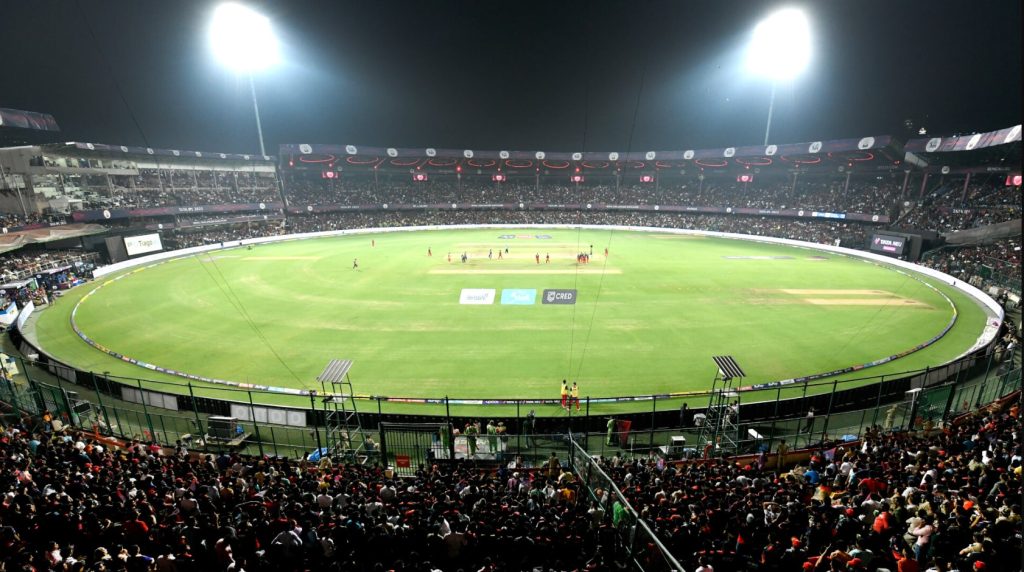M. Chinnaswamy Stadium: Located in the heart of Bengaluru, Karnataka, the M. Chinnaswamy Stadium is one of India’s most iconic cricket grounds. Known for its electric atmosphere, lush outfield, and high-scoring matches, this stadium has played host to countless memorable moments in international and domestic cricket. One often overlooked but crucial aspect of this ground is its boundary length—a factor that significantly influences how the game is played.
M. Chinnaswamy Stadium: In this article, we will explore the boundary dimensions of M. Chinnaswamy Stadium, understand how they compare to other major grounds, and evaluate their impact on players and match strategies.
1. Overview of M. Chinnaswamy Stadium
| Feature | Details |
|---|---|
| Location | Bengaluru, Karnataka, India |
| Established | 1969 |
| Capacity | Approx. 40,000 spectators |
| Owner | Karnataka State Cricket Association |
| Primary Tenant | Royal Challengers Bangalore (IPL) |
| End Names | Pavilion End & BEML End |
| Pitch Type | Typically batting-friendly |
M. Chinnaswamy Stadium: Before we dive into the specifics of boundary lengths, it’s essential to understand that Chinnaswamy is not a very large ground. It is known for being one of the more batsman-friendly venues in India, largely due to its smaller boundary sizes and high-altitude location, which allows the ball to travel farther.
2. Average Boundary Dimensions at M. Chinnaswamy Stadium
Boundary dimensions in cricket grounds can vary slightly based on pitch positioning and event requirements. However, most professional stadiums have a set range they stick to during international and IPL matches.
| Boundary Type | Approximate Length (in meters) |
|---|---|
| Straight Boundary | 70 – 75 meters |
| Square Boundary | 60 – 65 meters |
| Fine Leg/Third Man | 55 – 60 meters |
| Long-on/Long-off | 65 – 70 meters |
| Deep Midwicket | 60 – 65 meters |
These dimensions place Chinnaswamy among the smaller grounds in international cricket, especially when compared to venues like the Melbourne Cricket Ground (MCG), which has square boundaries pushing 85+ meters.
3. Influence of Altitude and Weather Conditions
The stadium is located around 920 meters (3,020 feet) above sea level, making it one of the highest cricket grounds in India. The thinner air at this altitude means:
- Less air resistance, allowing the ball to travel farther.
- Easier six-hitting conditions for batters.
- Bowlers, especially spinners, need to adjust flight and pace.
This natural condition, combined with shorter boundary lengths, makes Chinnaswamy a nightmare for bowlers and a paradise for power-hitters.
4. Comparison with Other Major Indian Stadiums
| Stadium | Avg. Straight Boundary | Avg. Square Boundary | Altitude (m) | Batting Friendly |
|---|---|---|---|---|
| M. Chinnaswamy (Bengaluru) | 70–75 m | 60–65 m | 920 m | Very High |
| Eden Gardens (Kolkata) | 75–80 m | 70–75 m | 9 m | Moderate |
| Wankhede (Mumbai) | 72–77 m | 65–70 m | 11 m | High |
| Narendra Modi (Ahmedabad) | 75–80 m | 72–75 m | 53 m | Moderate |
| HPCA (Dharamshala) | 70–75 m | 65–70 m | 1,457 m | Variable |
From the table, it’s clear that Chinnaswamy consistently offers the shortest square boundaries among major Indian venues. Combined with the altitude, this greatly influences scoring patterns.
5. Impact on Batting and Bowling Strategy
Batting Strategy
- Power Hitters’ Haven: Players like AB de Villiers, Chris Gayle, and Virat Kohli have frequently dominated at this venue thanks to the small boundaries.
- Confidence Boost: Middle-order batters often take more risks knowing they can clear the ropes even with mistimed shots.
- Running Between Wickets: With boundaries easier to find, there’s slightly less emphasis on running hard between the wickets compared to other venues.
Bowling Strategy
- Spinners Under Pressure: The combination of short square boundaries and altitude makes it tough for spinners to control run flow.
- Yorkers and Wide Lines: Pacers often resort to yorkers or wide lines outside off-stump to reduce the chances of batsmen getting under the ball.
- Variation is Key: Slower deliveries, cutters, and deceptive lengths are critical to success here.
6. Boundary Records at Chinnaswamy Stadium
| Record Type | Details |
|---|---|
| Most Sixes in an IPL Match | 33 sixes (RCB vs CSK, 2018) |
| Highest IPL Team Score | 263/5 (RCB vs PWI, 2013) |
| Most Career Sixes at Venue | Chris Gayle – Over 100 sixes in IPL at Chinnaswamy |
| Fastest 50 in IPL | KL Rahul (14 balls, 2018) – Significant contribution from small boundaries |
These records emphasize how the boundary dimensions dramatically affect gameplay, especially in T20 cricket.
7. Evolution of the Boundary Lengths Over Time
Over the years, there have been subtle adjustments in the boundary lengths due to:
- Safety Regulations: ICC mandates a minimum of 65 meters for international matches (where possible).
- Broadcast Enhancements: Some boundaries are pulled in to make space for camera tracks or sponsor boards.
- Pitch Rotation: Depending on the strip being used (center or side wicket), boundary sizes on either side may slightly differ.
| Year | Average Straight | Average Square | Comment |
|---|---|---|---|
| 2010 | 72 m | 63 m | Standard pitch layout |
| 2015 | 70 m | 61 m | Slight pitch rotation |
| 2020 | 68 m | 60 m | Sponsor-driven setup |
| 2024 | 70–72 m | 62–64 m | Return to balance for competitive edge |
8. How Boundary Size Affects Fan Experience
- More Sixes = More Excitement: Fans love high-scoring thrillers, and Chinnaswamy offers plenty.
- Closer to the Action: Due to the compact size, fans are physically closer to the boundary rope and players.
- Increased Merchandise and Branding: Shorter boundaries make advertising boards more visible on television, benefiting sponsors.
The boundary length at M. Chinnaswamy Stadium is more than just a physical measurement—it is a defining characteristic of the ground. With its compact size, high altitude, and fast outfield, it creates a unique playing environment that has shaped the careers of many legendary cricketers. Whether you’re a cricket strategist, a fan, or an aspiring player, understanding the dimensions of Chinnaswamy can give you valuable insight into how modern cricket is evolving—toward faster scoring and electrifying entertainment.
As the game of cricket continues to evolve, so too will the role that stadium architecture plays in shaping the spectacle. For now, M. Chinnaswamy Stadium remains a jewel in Indian cricket’s crown, known for its boundary-busting action and the roars of 40,000 passionate fans.


